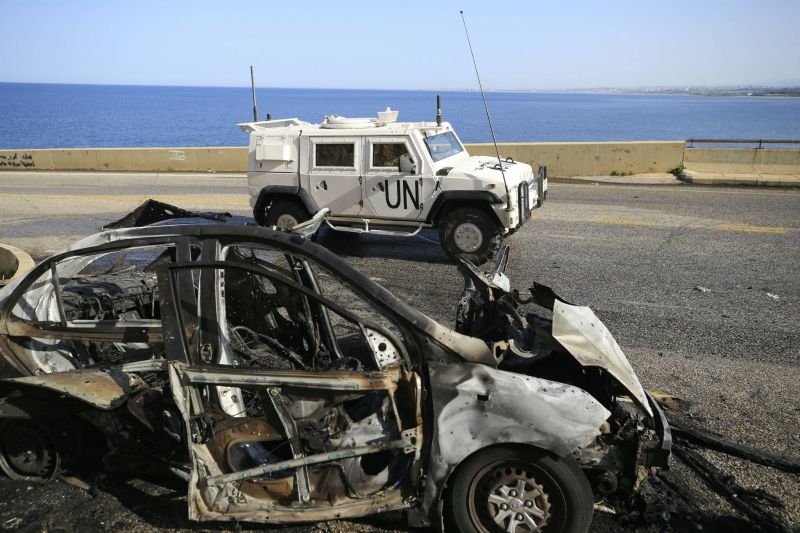
A UNIFIL (United Nations Interim Force in Lebanon) patrol drives past the wreckage of a car that was targeted in Israeli strike early on March 2, 2024, near the southern Lebanese town of Naqoura. (Credit: AFP)
Want to get the Morning Brief by email? Click here to sign up.
Catch up on our LIVE coverage of Day 147, Day 148 and Day 149 of the Gaza war.
Hezbollah announced the death of nine members between Thursday and Saturday, including in a strike on a car on the coastal road near Naqoura, as it continued to trade cross-border fire with Israel. By L’Orient Today’s count, 229 Hezbollah members have been killed since Oct. 7. Israeli strikes noted across southern Lebanon, hit several houses though no injuries were reported — owing to the displacement of 91,288 of the area’s residents, according to the International Organization for Migration’s (IOM) latest estimate. IOM figures show that nearly four out of five displaced people are in Sour and that the same ratio of fleeing southern Lebanon residents have taken refuge with their families. Overnight between Sunday and Monday, Hezbollah claimed to have foiled two attempts by Israeli forces to enter Lebanese territory – near Rmaish and Ramieh respectively. Israel has not commented on the incident to confirm or deny Hezbollah's claims.
US envoy Amos Hochstein, who mediated the indirect Lebanese-Israeli maritime border negotiation that concluded last October, is scheduled to return to Beirut today, deputy Parliament Speaker Elias Bou Saab told Reuters. Hochstein is bringing “serious ideas that could be the beginning of a lasting solution,” Bou Saab continued. The Lebanese Foreign Ministry is also set to respond this week to French suggestions for pacifying the Lebanese-Israeli border, caretaker Foreign Affairs Minister Abdallah Bou Habib told Al Jazeera Friday. Expressing Lebanese readiness for “indirect negotiations” with Israel, Bou Habib said Lebanon wants a “comprehensive solution” for the southern border — on which several demarcating points remain contested and Israel continues to occupy Lebanese-claimed territory (Shebaa Farms, northern Ghajar, Kfar Shouba Hills). Border negotiations culminate France’s multi-phase suggestion made last month to calm clashes between Hezbollah and Israel, beginning with a cease-fire followed by the former’s withdrawal 10 kilometers from the border region — a shorter distance than the buffer zone where the Lebanese Army and United Nations peacekeepers hold a force monopoly, delineated to end the 2006 Hezbollah-Israel war in UN Security Council Resolution 1701. Meanwhile, Lebanese Army commander Joseph Aoun rallied support for Lebanon’s military during a visit to Rome. Emphasizing Lebanon’s preference for peace, Bou Habib reiterated Lebanon’s preference for a diplomatic solution and responding to repeated Israeli threats, Bou that if a war is “imposed” on Lebanon, it would be ready. In October and November, the government approved several contingency plans to maintain essential services, including telecoms and the Beirut International Airport, operational in the event of war.
The day after oil leaks from disused North Lebanon pipelines ignited, protesters on Sunday called for urgent disposal of explosive materials abandoned in the oil installations south of Tripoli, which a February Central Security Council report warned could detonate, L’Orient Today’s correspondent reported. The Energy Ministry told L’Orient Today it had taken note of protesters’ demands after being accused of indifference by protest organizer, Hassan Ghamraoui, the president of the al-Fayha Municipalities’ Union (which includes the municipalities of Tripoli, Mina, Beddawi and Qalamoun). On Saturday, a fire broke out in a pipeline crossing on the coastal road to Minyeh in North Lebanon, spreading to the surrounding area, reaching farm tents and Syrian refugee camps. These pipelines, formerly belonging to the Iraq Petroleum Company (IPC), cross Lebanese territory from the Lebanese-Syrian border, through the Akkar plain and the town of Minyeh, to the Beddawi oil installations north of Tripoli. After decades of disuse and disrepair along with regular vandalization, the pipelines have repeatedly leaked oil and contaminated nearby agricultural land.
Derelict fertilizer from Yemen’s Houthi rebels’ attack on the Lebanese-operated Rubymar cargo ship risks causing a “cascading” environmental catastrophe, US Central Command (CENTCOM) and Greenpeace warned on Saturday. The release of thousands of tonnes of fertilizer into the Red Sea poses a risk of “major environmental crisis” to marine ecosystems, Greenpeace MENA program director Julien Jreissati said. The Rubymar’s twenty-man crew safely evacuated to Djibouti after Houthi missiles struck the ship’s deck and engine room, operator Blue Fleet CEO Roy Khoury told L’Orient Today.
At least 30,410 people have been killed in Gaza since Oct. 7, according to the latest figures from the enclave’s health ministry. “Once a famine is declared, it is too late for too many people,” UN humanitarian agency (OCHA) spokesman Jens Laerke said on Friday amid multiplying warnings of mass starvation in Gaza. Gazans’ access to international aid has been limited by Israeli restrictions to funnel it to the war-torn enclave and the dangers faced by humanitarian workers to distribute it — along with that faced by Palestinians to receive it, as international actors continued to lambast Israel after its military killed at least ten people and injured hundreds others rushing for aid on Thursday. By Friday, 10 children had died from “malnutrition and dehydration” in northern Gaza’s Kamal Adwan Hospital. Ceasefire talks stalled after Israel boycotted a Cairo meeting in response to Hamas’ refusal to name the people taken hostage on Oct. 7 who were still alive in Gaza. Hamas said it would refuse to release hostages before obtaining a guarantee of a permanent ceasefire. The group claimed on Friday that Israeli bombardment has killed more than 70 people abducted from Israel.
In case you missed it, here’s our must-read story from over the weekend: “Do Gen Z’s top students want to stay in Lebanon? We went to a high school Model UN to find out”
Compiled by Abbas Mahfouz
